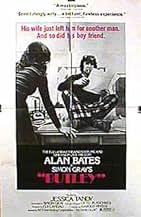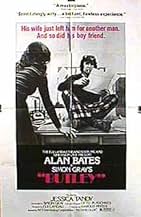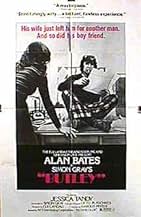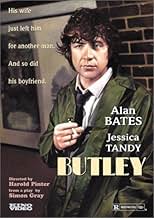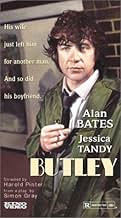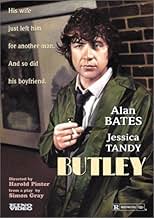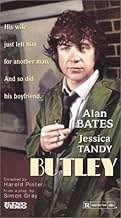An English professor finds his life crumbling around him.An English professor finds his life crumbling around him.An English professor finds his life crumbling around him.
Jill Goldston
- Tube Passenger
- (uncredited)
Lindsay Ingram
- Female Student
- (uncredited)
Anthony Lang
- Tube Passenger
- (uncredited)
Patti Love
- Female Student
- (uncredited)
Belinda Low
- Female Student
- (uncredited)
Derrick O'Connor
- Irishman in pub
- (uncredited)
John Savident
- James
- (uncredited)
Susan Wooldridge
- Female Student
- (uncredited)
- Director
- Writer
- All cast & crew
- Production, box office & more at IMDbPro
6.7924
1
2
3
4
5
6
7
8
9
10
Featured reviews
Astonishing virtuosity
The American Film Theatre was a praiseworthy effort to present classic modern plays to a wide audience. The series petered out when it became clear that there was in fact not enough of an audience to make the venture viable. This left us with a group of films, or rather filmed plays, of varying quality but always interesting, if not only for the wonderful casts assembled for the series. "Butley" was one of the best. After years of oblivion, the series is finally and thankfully being released.
The problem with Simon Gray's very engaging play is that the characters are people one would hardly want to meet. They are a deeply flawed, unlikable bunch. As such we have little sympathy for any of them and hence Gray, intentionally or not, does not allow the viewer to connect emotionally with his characters. He instead allows us to watch as Ben Butley's life slowly disintegrates before our eyes. Despite the enforced detachment, it still remains a fascinating process, thanks to Pinter's precise direction, Gray's very sharp dialogue and Alan Bates delivering an astonishingly virtuoso performance.
It's one of those extremely rare performances in which the actor becomes completely engulfed by the character. It's a feat to behold; almost scary at times. This alone makes "Butley" an unforgettable experience.
The problem with Simon Gray's very engaging play is that the characters are people one would hardly want to meet. They are a deeply flawed, unlikable bunch. As such we have little sympathy for any of them and hence Gray, intentionally or not, does not allow the viewer to connect emotionally with his characters. He instead allows us to watch as Ben Butley's life slowly disintegrates before our eyes. Despite the enforced detachment, it still remains a fascinating process, thanks to Pinter's precise direction, Gray's very sharp dialogue and Alan Bates delivering an astonishingly virtuoso performance.
It's one of those extremely rare performances in which the actor becomes completely engulfed by the character. It's a feat to behold; almost scary at times. This alone makes "Butley" an unforgettable experience.
A bit staged but great dialogue
This really plays much like a filming of a play. The direction is almost minimal. That's probably for the good given that what remains is a great bit of showmanship.
Alan Bates is stunningly good as the lead Butley. He's a brilliant professor and writer at the end of his career. There is some amazing scheming between his character and younger more promising acolytes that he is jealous of.
The only reason to watch this is for the dialogue which is sharp and literate -- one wonders what became of this. The version I saw was a film version of the play. Not much of production value but the playwright's craft is still preserved. Even mentioning all of this, it's amazing how well this holds up almost 40 years later. That's probably due to Bates' bravura performance.
Alan Bates is stunningly good as the lead Butley. He's a brilliant professor and writer at the end of his career. There is some amazing scheming between his character and younger more promising acolytes that he is jealous of.
The only reason to watch this is for the dialogue which is sharp and literate -- one wonders what became of this. The version I saw was a film version of the play. Not much of production value but the playwright's craft is still preserved. Even mentioning all of this, it's amazing how well this holds up almost 40 years later. That's probably due to Bates' bravura performance.
Battling Bates
Harold Pinter's film version of Simon Grey's play allows full reign to Pinter's playfully sinister sense of humour in this sardonic tale of academic office politics with Alan Bates playing the original bull in a china shop.
Watching him compulsively winding people up you desperately just keep wanting him to quit. And despite forever getting one final chance (SLIGHT SPOILER COMING:) he never does.
Watching him compulsively winding people up you desperately just keep wanting him to quit. And despite forever getting one final chance (SLIGHT SPOILER COMING:) he never does.
Just the best.
When I first saw this film, Ben Butley fascinated me (my cousin, who saw it with me, hated him). I've seen the film many times since then--I bought the video before I had a VCR to play it on--and it remains my favorite movie. And Alan Bates remains my favorite actor, although he's not at all like Butley. I wouldn't recommend the film to everybody, because it's a filmed play, totally in one room, all talk. Ah, but what talk, what dynamics between characters, what vicious game-playing and ruthlessness and humor. Simon Gray's never written a better play.
A tour de force...yet also not enjoyable at the same time.
"Butley" is a film version of the play by the same name that also starred Alan Bates. This is fortunate, as so often when plays are brought to film, the producers completely recast the actors. And, I must say Bates did an amazing job in the lead.
That being said, although Alan Bates did a great job playing a very caustic man, the film itself if probably NOT something most folks will enjoy. He plays a cynical, lazy, nasty alcoholic....the type person you really WOULDN'T want to spend much time with nor build a film around them. In other words, Bates did a great job playing someone you'll strongly dislike...or worse. There really is NOTHING to like about Butley...nothing. And that is why this is an unusual film...very well made but thoroughly unenjoyable after a while.
That being said, although Alan Bates did a great job playing a very caustic man, the film itself if probably NOT something most folks will enjoy. He plays a cynical, lazy, nasty alcoholic....the type person you really WOULDN'T want to spend much time with nor build a film around them. In other words, Bates did a great job playing someone you'll strongly dislike...or worse. There really is NOTHING to like about Butley...nothing. And that is why this is an unusual film...very well made but thoroughly unenjoyable after a while.
Did you know
- TriviaFilm direction debut and sole film direction credit for Harold Pinter.
- Quotes
Ben Butley: I'm a one-woman man, and I've had mine, thank God.
- How long is Butley?Powered by Alexa
Details
- Runtime
- 1h 34m(94 min)
- Sound mix
- Aspect ratio
- 1.85 : 1
Contribute to this page
Suggest an edit or add missing content


